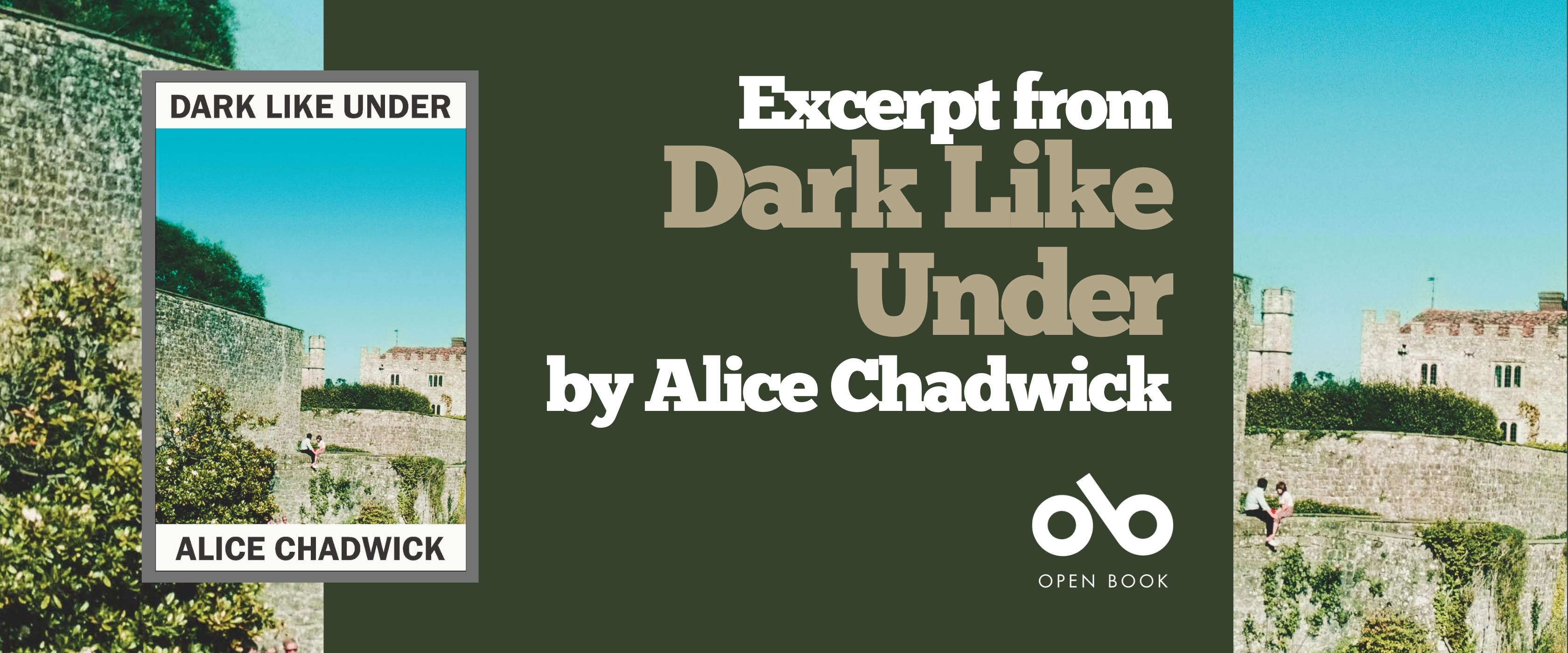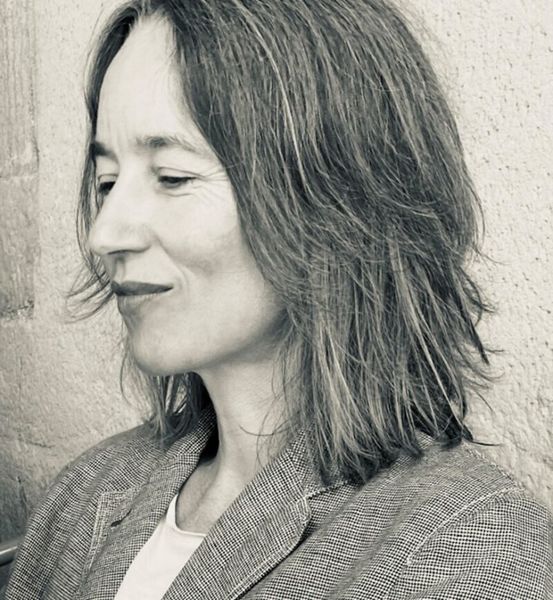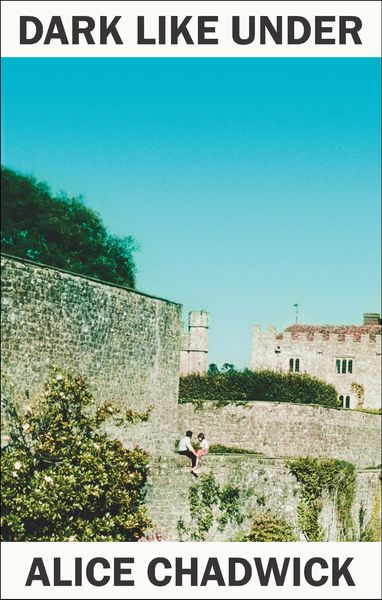Read an Excerpt from Dark Like Under by Acclaimed Author Alice Chadwick
After winning international acclaim for her debut novel, Alice Chadwick is sure to be an author on the rise and one that avid fiction readers will become increasingly familiar with in years to come. This is certainly the case in Canada, as rights were acquired for the novel from Biblioasis, and Dark Like Under has now been released on this side of the Atlantic.
The novel places us in an English school where students and teachers alike are grieving a tragic loss. But life carries on, as does the daily routine of classes and social life. Then, as one particular spring day wears on, some of the underlying secrets and emotions swell against the heat. With relationships and bonds strained and rivalries escalating throughout the school, everything threatens to boil over. And, outside of those walls, in a authentically depicted 1980s UK town, economic unrest and labour actions add layers of nuance to the complex and richly drawn drama unfolding on the page.
Check out a riveting excerpt from this lauded novel, right here on Open Book!
An Excerpt from Dark Like Under by Alice Chadwick
The Weir / Solar Midnight
IT WAS ONLY the second time Robin had walked the weir. The first time had been the summer she met Tin and Tin had made the hot, empty days sparkle like broken glass. ‘Let’s walk the weir,’ Tin said one slack afternoon, and they had, their bare feet on the cold stone, the fine green waterweed combed straight by pulling water. Coming out numb on the other side, they had walked the long way around, past the chip shop and over the bridge, to reclaim their shoes. Robin had wanted to push her. She would have pushed her, but Tin was always too quick.
The second time was Sunday night, the night of the last-minute party. Why Tin wasn’t there, nobody knew. Sometimes she came to things, sometimes she didn’t. Robin had gone around to find out and seen her from the street, upstairs at her desk, wearing glasses that Robin didn’t even know she owned.
‘What are you doing?’ Robin shouted up. Three storeys. Tin pushed the sash of the window higher. Above the glasses, her eyebrows arched black. She held a piece of paper out, a bright blank in the softening dusk, revved a lighter and, when the corner took, flames darting up, she let it go. The blazing paper sat in the air, borne up by a rising sheet of fire, held down by its own weight, until the flare sharpened to a point, ash swallowing the whiteness, and it began to sink, breaking up, burning itself out, landing in flakes on the channel of dark water that ran in front of Tin’s house.
‘I-love-you letters,’ Tin said. ‘Mostly hot air.’
‘To you or from you?’ Robin called up, but Tin was already back at her desk. In Robin’s mind, ‘Fire in Cairo’ was on the record player, although she might only have imagined that. Tin attracted coincidences, fire and fire, but it was Robin, really, who always played The Cure. She stood for a moment, beside the narrow stream, below the tall house, its darkening glass, then walked away alone. ToTin, obviously, Robin thought later, following Jonah back down the hall, into the party. From Jonah, probably. If it had been a letter.
Your CanLit News
Subscribe to Open Book’s newsletter to get local book events, literary content, writing tips, and more in your inbox
If it hadn’t only been Tin’s homework, an essay Robin hadn’t written yet. Comedy in Hamlet. Robin was two weeks late with that. ‘You’re so nice,’ Jonah kept saying, trying to untangle Robin’s earring from the net of her jumper. ‘Why are you so nice to me?’ She hadn’t, in truth, been nice to him, no more than any other night. She had offered him a swig of a bottle. She had sat down with him against the wall and listened to him talk. Francis Bacon, SLR cameras. David Bowie’s suits. She had followed him up through the crush on the stairs and back down again. But Tin wasn’t there. They were both aware of that.
They left the party. Often they wandered around, any combi- nation of them, between the pub that let them in, the off-licence that sold them vermouth and the roundabout where they drank it. Jonah turned into a back lane Robin didn’t know. It was dark, without streetlamps, a rough track, and even though she was with Jonah, she felt lost in her own town and somehow afraid. They walked between high banks of nettles and into a gravelled opening. Motorbikes in pieces, pallets stacked square like forts. Skirting some dark buildings, they went in around the back.
Later, he wanted to go to the park. They crossed the humpback bridge and turned into the narrow strip of grass that runs along the river. The lights of the football club yellowed the darkness. The willows draped their hair into the moving water. It was then that she realised how out of it Jonah was. He staggered, and more than once fell down and she had to pull him up. They were laughing, but it wasn’t how she’d imagined it would be. They made it to the weir, where he folded himself to the ground, his long legs and arms unwieldy. The water slid shiny in the dark, then plunged down in boiling confusion.
‘Do you want to walk it with me?’ he asked, rolling over, his head dropping sideways to his arm. A button-down collar but his shirt wide open.
‘Ok-ay,’ she agreed, but she knew that they shouldn’t. He was stoned and she wasn’t a swimmer. She hadn’t been the kind of kid who ever got taken to lessons. But Jonah had already unlaced his boots. He tugged off his socks and threw them away.
The water was high, its pull strong and the flat stones thicker than she remembered with soft, traitorous waterweed.
‘Hold my hand,’ he instructed. ‘I need you to keep me upright.’ And they started out, her feet burning with cold, across the rush- ing black.
Could he feel what she felt, the humming between the skin of their hands? A skateboard vibrating over loose ground, a car engine idling. But he stopped, not even halfway across, and released his grip. He was trying to turn around. He was giving at the knees as if to sit down.
‘You know she doesn’t give a fuck?’ he shouted, over the drum- ming volume of water. ‘Not about you. Not about me.’ He threw an arm around her, clumsy like a heavy rope. She thought he would kiss her but his head landed hard on her collarbone. ‘I can’t anymore, but she has to let somebody.’
‘What?’
‘Let somebody in. Her heart’s—’
Robin didn’t want to hear what Tin’s heart was. She was tired of Tin’s heart. She stopped trying to hold them up. She and Jonah were unevenly matched, he much taller than her, and when her foot slid and balance failed, she gave her body to his falling weight. Why not fall? she thought, as he collapsed in stages like a building and they went over into the shocking cold, the water hitting hard, legs and arms flung down.
How cold and dark and big underneath, a liquid roar closing over her head. It can’t, she knew, be this deep, but she couldn’t find a footing. The weir kept battering, pushing her down. She felt a punch through the thickness of the pounding water, then his hand firm around her chin, yanking her skull upwards, sideways, dragging her spine, her beating limbs with it; Jonah pulling her out, lifesaving, like they were supposed to have learnt at school. A choking gulp of air. A crash to the back of her head: the concrete edge of the weir pool. She knew this rough platform. She had stubbed her toes, scraped her knees sitting here many summers. Already out, he hauled her up by a wrist and an elbow.
‘Why the fuck did you do that?’ he asked. On the bank, flood- ing the grass with water, he seemed pin-sharp sober.
‘I didn’t mean to.’ Her clothes hung heavy. The back of her brain felt thick.
‘Let’s go,’ he said, turning, hooking up his boots.
Casting around for her shoes, she saw the shadow of someone, a man, approaching.
‘Hello, Robin. Jonah.’ A quiet voice. Mr Ardennes.
‘Evening,’ said Jonah, gathering himself together, a sturdy citizen. ‘You’re up late.’
‘Late, or too early,’ Mr Ardennes said. ‘I wondered if the heron was here.’
Jonah looked around. ‘Is it?’
‘No. The water’s too high, perhaps.’ ‘Maybe we frightened it away,’ said Robin. ‘I don’t think so.’
Mr Ardennes had come to a stop. He seemed different in the dark. Not older, exactly, but less, as if the night had worn him thinner. He stood with his head at a tilt, courteous but appraising. His hair, cut like a boy’s, looked trampled like grass. The soft fabric of his jacket drew the darkness to him. His arms were bound to his sides, his hands like weights in his pockets.
He walked around at night, Robin knew. She had seen him before. And when he had to take school assembly, he spared them God and talked about birds, their nocturnal calls, the dark respiration of trees, the sudden shifts in the town’s water meadows, fragile and complicated, as if night was a younger wayward sibling they should all look out for.
‘Are you both okay to get home?’ he asked them.
‘We’re heading off now,’ said Jonah. Mr Ardennes nodded.
‘School tomorrow,’ Robin said conversationally, or trying to excuse herself, and immediately the church clock began to strike, its low, dull thuds vibrating as much in the wet ground as through the air.
‘It might already be tomorrow,’ Mr Ardennes said.
Robin smiled, then shivered. Her teeth and bones rattled with cold.
Mr Ardennes wished them goodnight and made a sidestep around them. But it seemed that until they went, he could not go, and so they started off and he, released, walked away at pace.
‘Take it easy,’ Jonah called after him.
It was the wrong thing to say, Robin felt, to someone like Mr Ardennes. To someone so spare and occupied, who looked like he might walk and keep walking and never be easy.
‘He didn’t say anything,’ she reflected, weighing the dripping hem of her jumper. It had stretched almost to her knees.
‘He looked a bit rough.’
‘Worse than us?’ Under the faint sulphur cast of the night, Mr Ardennes had looked drawn, even for him, and bruised around the eyes. Yet his voice in the dark had been the same. Steady, consid- ering, like a kindness. ‘Maybe he’s an insomniac,’ she suggested.
‘Maybe his wife snores.’
They walked back along the river, the idea of Mr Ardennes grow- ing vague, fading in the porous dark. Robin tugged at her leggings, the wet cloth sullen, sticking in unaccustomed places. Her mohair jumper lay cold across her back. They left the park and entered the empty, stone-slabbed streets. Intermittent streetlamps. What might have been a dog, pulling its shadow around a corner. Out- side her house, under the dud carriage lamp, they came to a stop.
‘I’m in trouble now,’ Jonah said.
‘You’re dead meat,’ Robin agreed, and felt a queasy lurch in her stomach. ‘And so am I.’
Jonah frowned and stepped back. He was looking at her shoes, which were the same as Tin’s but with fake zips and more beaten up. Well, there was no point denying it. They had left the party together and everyone had seen them. And there was no fooling Tin, even if they wanted to. Whenever Robin tried to lie, Tin just laughed, or looked straight through her. They would both have to face her. And soon. Tomorrow. Because tomorrow was Monday, and it might already be tomorrow.
__________________________________
Alice Chadwick studied English at Cambridge, and was a student on City Lit’s selective fiction Masterclass. Dark Like Under is her first novel. She lives in London.







